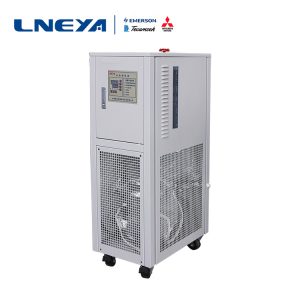Der Hersteller erklärt, welche Einflüsse der Ölstand und der Ölunterschied der Kältemaschine haben?
The chiller manufacturer tells everyone that in addition to the refrigeration system, the lubricating oil system is also an important part, with its own oil reservoir and special oil cooler. Therefore, we must understand the influence of the oil level and oil difference of the chiller?

Oil level
It refers to the level of lubricating oil in the oil storage container. The oil storage containers of low-temperature chillers are equipped with oil level display devices. Generally, it is stipulated that the oil level in the oil storage container should be 5mm above and below the central horizontal line of the sight glass. The purpose of specifying the oil level is to ensure that when the oil pump is working, the amount of oil required to form an oil circulation is sufficient. If the oil level is too low, it is easy to cause insufficient oil pumps, which may cause operation failures or damage the equipment.
Oil pressure difference
It is the guarantee that lubricating oil needs to overcome the flow resistance when it flows to various working parts in the pipeline of the oil system under the drive of the oil pump. Without sufficient oil pressure difference, it is impossible to guarantee that the lubrication system of cold and low temperature chiller has sufficient lubrication and cooling oil and the power required to drive the energy regulating device. Therefore, the low temperature chiller manufacturer reminds that the oil pressure difference of the oil system It must be ensured in a reasonable range so that the moving parts of the unit can be fully lubricated and cooled, and the energy adjustment device can be manipulated flexibly.
Oil temperature
Oil temperature refers to the temperature of lubricating oil when the chiller is working. The oil temperature has an important influence on the viscosity of the lubricating oil. If the oil temperature is too low, the viscosity of the oil will increase, the fluidity will decrease, and it is not easy to form a uniform oil film, so the expected lubrication effect cannot be achieved, and it will also cause the oil flow speed to decrease, reduce the lubrication volume, and the power consumption of the oil pump. Increase; if the oil temperature is too high, the viscosity of the oil will decrease, and the oil film will not reach a certain thickness, making it difficult for the running parts to withstand the necessary working pressure, causing deterioration of the lubrication condition, aggravation of the moving parts, and failure of the chiller.
So let’s not say much, the chiller manufacturer believes that everyone also understands the impact of oil level and oil difference. In order to better use the chiller, you still need to understand these operating points carefully!
Verwandte Empfehlungen
-
Heat transfer oil circulation system refrigeration deterioration problem
2064I believe that many users have encountered the heat transfer oil circulation system after a long time of use, will feel the deterioration of the scene, LNEYA as a professional manufacturer to remind everyone, if you encounter these phenomena, user...
Details anzeigen -
Vorsichtsmaßnahmen für die Installation von Spezialkühlern für neue Energieprüfungen
1548Die Installation der Spezialkältemaschine für die Erprobung neuer Energien ist ein wichtiges Bindeglied vor dem Betrieb. Die Qualität der Installation steht in direktem Zusammenhang mit dem Betrieb und dem Betriebsstatus der Spezialkältemaschine für neue Energieprüfungen. Also, was...
Details anzeigen -
How to replace the scroll compressor of the impact tester model?
2146In terms of different impact tester models, the configuration is also somewhat different. Among them, special care should be taken when replacing the scroll is a compressor. If the replacement is not noticed, the impact tester cannot be used. The ...
Details anzeigen -
Introduction To The Preparation Of Low Temperature Chiller’ Operation
1844Why do low temperature chiller need to be ready for operation? We must be very clear that only when we are ready to check the low temperature chiller can we run the equipment better, can we run it more efficiently. Before running the low temperatu...
Details anzeigen
 LNEYA Industriekühler Hersteller Lieferant
LNEYA Industriekühler Hersteller Lieferant












